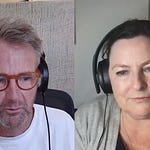Kia ora.
I got up yesterday morning to write my usual end-of-the-week reflections of the six main things that happened in our political economy in the last week or so, and why they mattered.
Lately, my daily emails and weekend ‘soliloquies’ have become laundry lists of policy vandalism, where I point to the most obvious announcements from the National-ACT-NZ First Coalition Government that are set (usually) to worsen Aotearoa’s already awful housing, climate and poverty situations.
It has begun to feel overwhelming, enervating and ultimately destructive. The Government is continually flooding the zone and it feels like the best I can do is to document the obvious and avoid drowning in a cascade of memes and lizard-brain-thinking dressed up as policies. It is exhausting and infuriating.
I keep wanting to send every member of the new Cabinet a copy of Thinking, Fast and Slow, the book by Nobel Prize-winning behavioural scientist (and economist) Daniel Kahneman about how reactive, short-termist decisions driven by our base emotions of fear, anger, greed and resentment are often bad decisions. And that we’d all be better off if we took some time to look at the evidence, park our ingrained assumptions and heuristics1, and find some long-term solutions that can live and be trusted through multiple terms of Government.
For example, just in the last week:
Associate Housing Minister Tama Potaka announced on Sunday the Government had removed 1,000 children from living in motels, but couldn’t say exactly where (or whether) they had found new homes, given the Government has halved funding for new social housing and stopped Kāinga Ora building new homes;
Transport, Energy and Local Government Minister Simeon Brown announced on Monday he was pushing ahead with congestion charging to pay for more motorways, but didn’t also announce a ramping up of public transport or any fair transitional help for drivers in poorer working and non-working families who don’t have alternatives;
Social Development and Employment Minister Louise Upston announced on Monday the imposition of tougher sanctions on unemployed and sick people who don’t turn up for job interviews or make themselves available for work, but couldn’t say exactly what would happen to those people when their incomes were cut;
Immigration Minister Erica Stanford and Foreign Minister Winston Peters announced on Wednesday the Recognised Seasonal Employer (RSE) scheme2 for temporary foreign fruitpickers living in sheds and hostels would be expanded by 1,250 to 20,750 for this coming season, wages for fruitpickers with less than two years experience would be cut 10% back to minimum wage, and employers would allowed to start increasing accommodation costs by 15% or $15 a week, whichever was the lesser.
Disability Issues Minister Louise Upston announced on Thursday the only-just-formed Whaikaha-Ministry of Disabled People would be stripped of its service delivery function and budget and those would be dumped into MSD, which disability advocates described as a shocking attack their communities;
Justice Minister Paul Goldsmith announced on Friday afternoon the appointment of Free Speech Union founding member Melissa Derby as Race Relations Commissioner to replace Saunoamaali’i Dr Karanina Sumeo, who has been acting Chief Human Rights and Race Relations Commissioner, and who as recently as yesterday expressed concern about the RSE scheme changes not addressing problems with worker welfare and low pay. Derby has spoken at anti-trans events and retweeted demands that trans people not be tolerated in society. Steven Rainbow was appointed as Chief Human Rights Commissioner. He has also supported anti-trans statements.
And those were just the formal policy announcements. All sorts of other issues arose this week, including:
the PM saying he wanted a bipartisan policy to fix our infrastructure deficits, despite his Government ordering a halt to new infrastructure projects and completely overturning the previous Government’s policies on housing, transport and water;
The Government barrelling ahead with plans to deal with a lack of renewable electricity generation by importing LNG and burning gas to generate power;
The Health Minister denying budget cuts or hiring freezes, despite widespread reports of exactly those things from doctors and nurses, and that a halving of pay for locums led yesterday to the Bay of Islands Hospital at Kawa Kawa closing for nights and weekends, causing an overloading of admissions to A&E at Whangārei hospital to at least 150% capacity; and,
It emerged the gun control minister regularly met with anti-gun-control activists, but had refused to meet with Police, who are responsible for running our gun control policies.
Finding a way to exit the flooded zone to make progress
For a few months I had hoped the dust would eventually settle from this onslaught of changes for the worse and that I’d get a chance to go deeper into the underlying problems with our housing, climate and poverty situations to suggest and test solutions in conjunction with our subscribers.
But I have begun to realise the constant barrage of outrages is not a bug within the current Government. It’s a feature. It is designed to distract, overwhelm and defeat those wanting to try or at least examine other policies, especially ones backed by actual evidence and that haven’t been tried before and failed before.
It dawned on me while listening to Juggernaut when Roger Douglas admitted the sheer speed and enormity of the changes he rammed through from 1984 to 1989 allowed much of it to pass without much opposition or real examination. We live daily now with the consequences of that onslaught. I was also reminded of Steve Bannon’s comment about how to drive through massive change:
“The Democrats don’t matter. The real opposition is the media. And the way to deal with them is to flood the zone with shit.” Steve Bannon quoted by Michael Lewis in this Bloomberg(gift) article from 2018.
Disorientation is the aim, not necessarily persuasion with facts or evidence, or to even find the best possible policy. Chaos seems like both the strategy and the tactic of choice, not a state to be avoided.
This last week seemed particularly bad. The last straw was the Race Relations Commissioner announcement from Treaty Relations and Justice Minister Paul Goldsmith on Friday. It felt as if National has abandoned any pretence to centrism or commitment to doing the sensible thing to ‘reach across the aisle’ and maintain civility. It was as if the Government began to troll us. In other words, let’s do this outrageous thing just to see how just outraged the ‘woke left’ can get.
For the lols: trademarked by Topham Guerin.
This may seem an over the top reaction to some who have often seen National Governments as a bastion of stability and compassionate conservatism that has, eventually, embraced our nation’s foundation in Te Tiriti. After all, some of the best Treaty Settlement Ministers have been National Ministers, including Doug Graham and Chris Finlayson. It was National that formed a coalition with Te Pāti Māori and rolled out Whanau Ora. It was National and (an admittedly very-different) Te Pāti Maori that launched the long-running and successful Smokefree 2025 campaign.
It has become clear that this latest National-led government is very different from previous National governments.
So what now? Let’s restart The Kākā Project, but by 2026 for 2050
Before the last election we ran a bunch of articles grouped around the idea of The Kākā Project. This was an attempt to suggest and test policy alternatives to those being discussed by the main parties in the 2023 election. I hope it helped to lift our eyes over and around the ‘Overton Window’ of topics that are deemed legitimate to discuss and address some of our fundamental problems. The sheer volume of news in the wake of the election forced me to just cover the news.
Now I’d like to restart The Kākā Project well ahead of the 2025 Local Government elections and the 2026 General Elections. That gives us some time to address some fundamental questions in an open way and suggest and test a bunch of policy ideas that might help the wider debates in those elections.
Here’s what I’d like to do over the next two years and how I’d like to structure it, starting with an exploratory phase through the rest of 2024 that does the following:
Asks six fundamental questions about what Aotearoa wants and how to get there;
Discusses those questions and possible solutions with a range of people in a series of interviews and ‘Hoons’;
Run a series of surveys of readers and subscribers to understand a wider view on the answers to these questions;
Propose a draft set of options as a base for refining and testing them; and,
Gathering and crystallising the views into a more refined set of policies by the end of 2024.
Then through 2025 I’d like to:
continue thrashing out and tempering those aims, methods and policies through the process of covering the 2025 Local Government elections; and,
finalising a set of coherent policies in an edited book and/or section of The Kākā that would be refined and finalised by the end of 2025.
Then during 2026, I’d like to:
launch a section of this website and/or book for free to a wider public for discussion through public webinars, online surveys, articles and podcasts from early 2026, up to and including the general election of late 2026;
the section of this website or book would be called The Kākā Project of 2026 for 2050 and include an edited summation of our exploration, the views of the people and subscribers we talked with, and the settled set of policies, as of the end of 2025; and,
I would interview the party leaders and politicians through 2026 and cover their election positions and policies in relation to the policies outlined in The Kākā Project of 2026 for 2050 (TKP 26/50)
This is for debate purposes only, not for creating parties or politicians
Just to be very clear, this is not some attempt to become involved in the actual political process. I don’t have the will or resources or skills to do anything like that and I think I can be of more use just continuing to put out my emails and podcasts as part of my effort to cover Aotearoa’s political economy around the issues of housing, climate and poverty.
My idea of success would be to open the ‘Overton Window’ a little during those election debates of 2025 and 2026. The usual parties and candidates will do and say whatever they like about The Kākā Project of 2026 for 2050, or nothing at all, knowing that we are simply part of the debate, not a competitor or contestant, and that we come to chat with an open mind, a generous spirit and in good faith.
This will create a bunch of ideas and public resources that might help the debate.
Starting with six questions …
The six questions I’d like to pose to subscribers, general readers and interviewees over the rest of the year are:
What population growth rate do we want on average over the next 25 years?
What specific improvements on housing, climate and poverty do we want by 2050?
What size and structure of Government spending and debt to GDP is needed to achieve those 2050 targets?
What would an emergency response to achieve the housing targets look like?
What would an emergency response to achieve the climate targets look like?
What would an emergency response to achieve the poverty targets look like?
For the purposes of discussion and context, my answers in various forms would be something like:
If we aim for our population growth rate to remain unchanged from its rate of the last 25 years at around 1.5% per annum, that would mean Aotearoa’s population would grow to 7.7 million by 2050, and 19 million by 2100. We are likely to increasingly become a climate refuge for a small portion of the richest 100 million people living within the overall population of 2 billion living in East Asia (China, India, Southeast Asia);
I believe houses should cost no more than 30% of average equivalised household disposable income to live in by 20503, regardless of whether it’s owned4 or rented5.
Aotearoa should aim to reach net zero for climate emissions by 2050, as legislated for currently, with any offsets bought and created in Aotearoa at NZ$150/tonne of C02 equivalent emissions reduced and/or stored permanently, with a broad-based carbon and carbon equivalents tax on all gases rising in $5 per year increments from $50/tonne in 2030 to $150/tonne by 2050, replacing the ETS from 2030.
I think we should hope that no one is in position to say in the Stats NZ Household Income survey they don’t have enough income for rent, food and electricity, and that no one is in a position to say in the survey their house has a major mould problem, or is a major problem to heat;
The size of both central and local Government spending to GDP and net central and local government debt to GDP should be 45% of GDP on average in the 20 years to 20506;
I want Parliament to enact emergency bipartisan legislation (The Aotearoa by 2050 Act (2026)) to create independent agencies answerable to Parliament to achieve the targets above by 2050, just as the Reserve Bank Act was legislated in 1989 and agreed by both major parties to independently achieve inflation of around 2%.
The sorts of policies that could achieve these aims include:
Agreeing a broad-based and low-rate annual Aotearoa by 2050 levy on the value of residential-zoned land of 0.5% for occupied land, 1.0% for unoccupied homes on residential-zoned land and 1.5% for residential-zoned land that is not built on;
Agreeing that Aotearoa by 2050 levy be used to achieve the Aotearoa by 2050 Act (2026), including paying for servicing the debt needed to build the necessary long-term water, housing and public transport infrastructure, as well as maintain the infrastructure;
Agreeing the levy be used to ensure those infrastructure and consenting costs are paid for by the levy and the debt it services, rather than the individual home buyers, land owners, developers or councils, in order to dramatically lower the marginal costs of new homes, and the levy be used to prioritise the building of new homes and public transport networks that dramatically lower housing costs, gross climate emissions and the number of unhealthy homes;
Agreeing that capital gains on real business values and non-residential-zoned land remain tax free and that savings cordoned off until retirement such as KiwiSaver funds do not pay tax on earnings while cordoned off;
Creating a publicly-funded joint job, education, health, food, power, housing and income guarantee for 18-35 year olds, including volunteering and unpaid family caring and community work as choices in that guarantee, and agreeing that the current arrangements for NZ Superannuation of incomes indexed to average wages, no means testing or asset testing and no change in the age of eligibility of 65 also apply to the income guarantee and the age thresholds; and,
Agreeing a fixed and progressive income tax scale for wages, salary, interest and dividend income of 25%, 30% and 35%, where the thresholds rise at the same rate as average incomes;
Agree the GST rate be progressively reduced to 10% by 2050;
Fixing rises in administered prices of Government and council services, including water, transport, rates, publicly leased land and other fees and charges to no more than 2% per annum until 2050; and,
That the Government pay council rates on Crown land and rebate GST on rates back to councils.
Interviewing the experts, participants and politicians
I’d look to do individual interviews and arrange Hoons with a range of people through the rest of 2024 and until the local elections in late 2025, to discuss current issues and The Kākā Project of 2026 for 2050 (TKP 26/50), including;
Mayors, councillors and council candidates from all councils and parties;
Ministers, MPs and candidates from all parties in and out of Parliament;
Home builders and Community Housing Providers currently building and/or managing more than 1,000 homes per year;
Bankers, fund managers, insurers and regulators currently financing, insuring and regulating the building, renting and operation of those homes;
Academics, consultants, planners, architects and economists working, researching and teaching on housing, climate and poverty; And,
Authors here and overseas of books on economics, politics, housing, climate and poverty.
I’ve enjoyed writing the above down on ‘paper’ and I welcome the thoughts of subscribers on the paid tier in the comments below or in the group chat. You can also message me directly on the app or just hit reply on this email.
This email and podcast was sent to all 21,500 free subscribers in full and is able to be fully shared, read and listened to.
Nga mihi nui and chocks away!
Bernard
PS: To do this consistently over the next couple of years, I’ll need to tighten up my daily emails and podcasts so please don’t be too surprised or disappointed if they’re shorter and less detailed. I’ll be dedicating more time to more detailed deeper dives, interviews and ‘Hoons’ for and about The Kākā Project of 2026 for 2050 from now on. If this is not what you want as a paying subscriber, please speak now or forever hold your peace.
Heuristics are mental shortcuts that help people make quick decisions, James Chen writes Investopedia. “They are rules or methods that help people use reason and past experience to solve problems efficiently. Commonly used to simplify problems and avoid cognitive overload, heuristics are part of how the human brain evolved and is wired, allowing individuals to quickly reach reasonable conclusions or solutions to complex problems. These solutions may not be optimal ones but are often sufficient given limited timeframes and calculative capacity.”
MBIE reported to Cabinet last year that the RSE scheme should be improved to keep its social license after numerous cases of migrant abuse, sub-standard housing and food, unfair deductions from wages and conditions described as modern slavery.
Average annual equivalised disposable income (after tax and transfer payments) increased from $53,192 to $56,919 (up 7.0 percent) in the year to the end of June 2023, with the average cost of housing being more than 40% of disposable income for 18.2% all households (up 2.9 percentage points), with 27.5% of households that did not own their dwelling (up 3.4 percentage points) paying more than 40% of income in housing costs, and 13.3% of households that owned or partly-owned their dwelling (including dwellings held in a family trust) (up 2.6 percentage points) paying over 40% of income in housing costs. There were 617,400 households or 31.4% paying more than 30% of averaged disposable income, Stats NZ reported for the year to June 30, 2023.
Currently 316,500 households or 24.8% of all homeowning households pay more than 30% of income for housing.
Currently 299,900 renting households or 44.5% or renting households pay more than 30% of disposable income in rent.
Both National and Labour have aimed in the past to keep the central Government revenues and debt to GDP at below 30% of GDP, while in the UK and Australia, revenues are closer to 45% of GDP and debts well over 50% of GDP.















Share this post